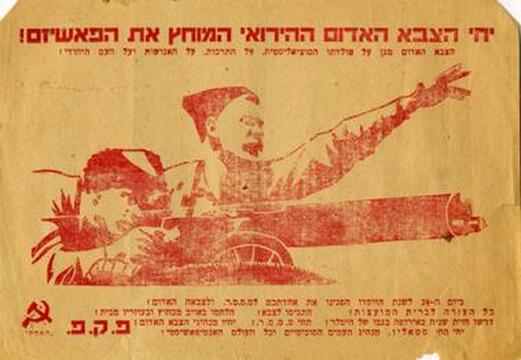|
In his book The Palestine Communist Party Musa Budeiri explores the history of the book’s namesake which attempted to unite the Palestinian and Jewish populations in Palestine into a united revolutionary front. Budeiri divides the party’s near 30-year history into three periods mainly based on changes in the party’s policy towards the specific situation in Palestine. Throughout its short history the Palestine Communist Party adopted many different positions regarding the specific situation in Palestine and their successes and failures reflect the difficulties of applying a Marxist analysis in a settler-colonial context. The party grew out of the “labor Zionist” movement of the early 20th century in the Jewish community of Palestine known as the Yishuv. Budeiri dates the party’s early period between its creation in 1919 and 1929. The first decade of activity was characterized by varying stances towards Zionism and attempts to work within Zionist labor groups which excluded Palestinian workers. This flirting with Zionism ended in 1924 when the party was expelled from the Histadrut (the Yishuv’s exclusively Jewish labor organization) and accepted by the Commintern as the official communist party of Palestine. With this, the party began to characterize Zionism as a pawn of British imperialism in Palestine and called for a joint Palestinian-Jewish proletarian struggle against their bourgeoisie. Despite this proclaimed internationalism, party membership was nearly entirely Jewish and had little presence among the majority the Palestinian population. Changing this would be a major focus of the party’s second phase between 1930 and 1942. Under the influence of the Commintern, the party set out to attract more Arab members and become a truly territorial party reflective of the actual population in Palestine. This policy change entailed a greater focus on the Palestinian anticolonial struggle and establishing Palestinian leadership of the party. The party succeeded at this task in many ways becoming an important influence in the Palestinian labor movement and playing a supporting role in the Arab Revolt between 1936 and 1939. However, this stance caused a rift between Palestinian and Jewish communists on the role of the Yishuv which would only widen in World War II. The failure to resolve this question led to the party’s split in 1942 which created separate Palestinian and Jewish communist parties. These parties would continue until 1948 and the nakba which effectively ended any cross-community communist party. There are many lessons to be drawn from the experience of the PCP, but I think the most important is regarding its answer to the question of settler-colonialism and the role of the Yishuv in Palestine. The party correctly recognized the policy of the British government to provoke religious and ethnic conflict to prevent united resistance to their colonization. With this, the party initially sought to promote unity between Palestinian and Jewish workers with appeals to overthrow their respective bourgeoisie. Even after the party placed its support firmly behind the Palestinian national struggle, it never came to a final resolution to the Yishuv’s presence in Palestine and many within the party hoped to continue working within it. This strategy, while appealing to Marxist sensibilities of proletarian solidarity, failed to account for the imperial and settler-colonial situation in Palestine. The party failed to recognize the extent of support for Zionism within the Yishuv and its ability to draw thousands of settlers to Palestine. On the other hand, as far as the Palestinain population was concerned the ever-growing Yishuv itself was as foreign entity and an ally of British imperialism. Thus, its constant growth, exclusionary economic policies and constant demand for land represented a threat to Palestinian society. So, while the party’s attempts to peel the Yishuv away from Zionism landed on infertile ground, its appeals to proletarian solidarity failed to resonate among an agrarian Palestinian population resisting colonization which it saw represented in the expanding Yishuv. In this book, Musa Budeiri ably explains the considerable successes of the Palestine Communist party as a joint Palestinian-Jewish party, it also explores the root causes of their ultimate failure. That was the party’s inability to provide a satisfactory answer to the question of settler-colonialism and truly reconcile the interests of Jewish settlers with indigenous Palestinians. In this book we can see the importance for any communis party in a settler-colonial to provide a solution to these issues and find ways to foster the revolutionary national aspirations of colonized people. AuthorAlex Zambito was born and raised in Savannah, GA. He graduated from the Georgia Institute of Technology in 2017 with a degree in History and Sociology. He is currently seeking a Masters in History at Brooklyn College. His Interest include the history of Socialist experiments and proletarian struggles across the world. Archives September 2021
1 Comment
From this review, it looks as though there are striking parallels between the Palestine Communist Party and the South African Communist Party.
Reply
Leave a Reply. |
Details
Archives
July 2024
Categories
All
|

 RSS Feed
RSS Feed